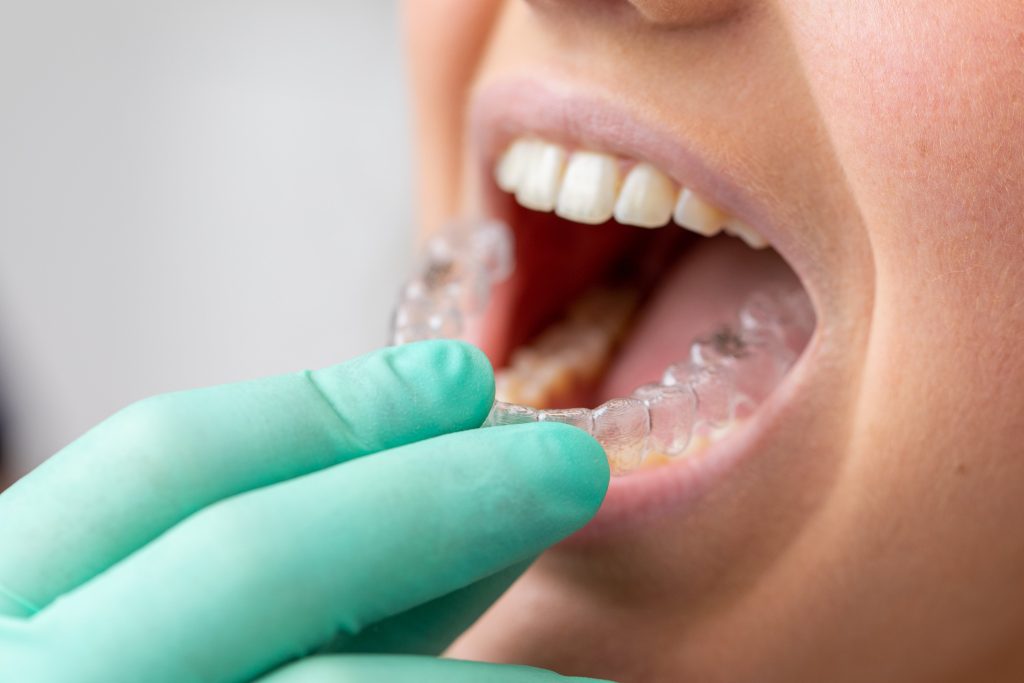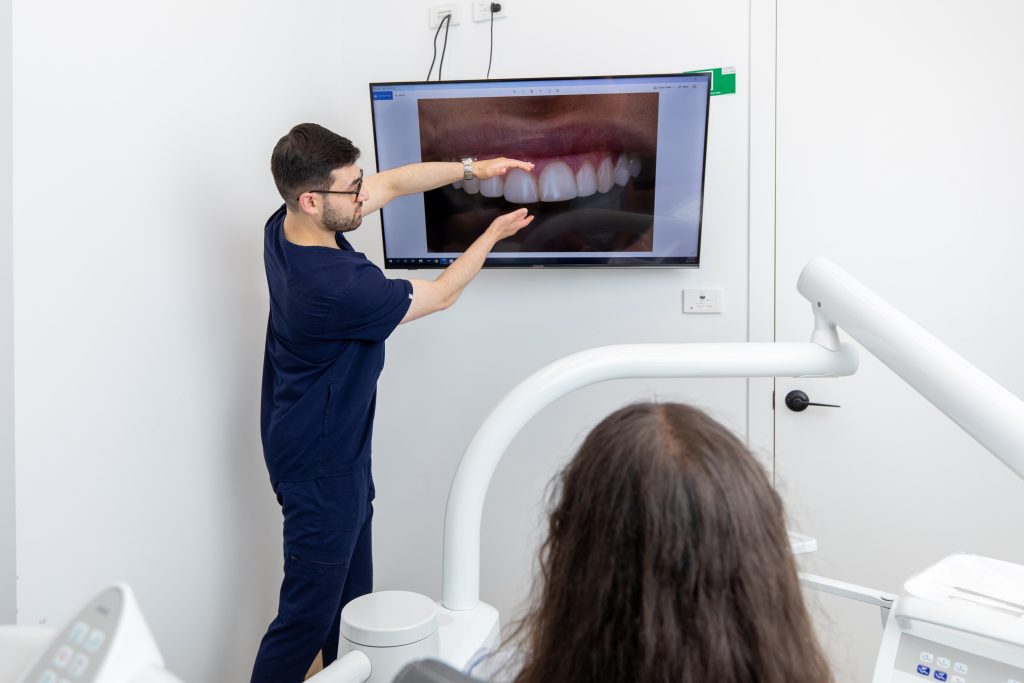Introduction
Everyone wants a healthy and beautiful smile, but some people have dental issues that prevent them from looking their best.
Dental issues like cracked teeth, discoloured enamel or misaligned teeth can make your smile unattractive. Fortunately, however, common dental problems like these can be easily fixed with a popular cosmetic dentistry treatment known as dental veneers.
What Is a Dental Veneer?
A dental veneer is a wafer-thin porcelain or composite resin layer bonded over your teeth’ front surface. An ideal solution for enhancing your tooth appearance, dental veneers can hide various aesthetic imperfections of your teeth, such as cracks, chips, misalignment, and discolouration.

How Do Dental Veneers Look?
Dental veneers that are perfectly designed and applied look better than your natural teeth. They enhance your smile by fixing issues like gapped teeth, misaligned teeth, and cracked or chipped teeth. Dental veneers can also help improve the appearance of discoloured teeth.
Dental veneers may be the best treatment option to fix minor aesthetic issues with your teeth. They are a less-invasive, affordable cosmetic dentistry treatment you may rely upon to achieve a beautiful smile.
What Conditions Can Dental Veneers Treat?
Dental veneers can be used to correct a variety of aesthetic issues:
- Gapped teeth: It is not a good idea to hide your teeth gaps or other imperfections behind your smile. These problems can be easily fixed with dental veneers. Veneers can fill in any gaps or conceal imperfections as they are custom-made to fit your teeth perfectly and offer a flawless appearance.
- Discoloured or stained Teeth: While many people are drawn to the convenience and perceived effectiveness of at-home tooth whitening kits, it’s important to remember that they may not work for everyone. Some individuals may not see any improvement or experience sensitivity due to using these products.
In addition, certain types of discolouration, such as those caused by fluoride exposure or medication use, may not respond well to tooth whitening agents. In these cases, veneers offer a more reliable solution for improving the appearance of your teeth. Not only can they effectively conceal discolouration, but they are also more resistant to stain buildup than natural enamel. So before reaching for those whitening strips or gels, consider consulting a dental professional about your options for achieving a brighter smile.. In such cases, veneers are are often a better solution to cover and improve the appearance of your teeth. Veneers are also more resistant to stains than natural tooth enamel, so they will likely stay whiter longer. - Cracked and chipped teeth: Dental veneers offer multiple benefits. For example, they improve the look of your cracked or chipped teeth and provide additional strength and resilience. Though dental veneers can fix various conditions, it is essential to know they may not be the ideal treatment for severely damaged teeth that may require different treatments, like a dental crown or implant.
- Minorly misaligned teeth: Achieving a straighter smile with dental veneers is possible. When patients choose dental veneers to improve the appearance of their slightly misaligned teeth, they save themselves the hassle of undergoing lengthy orthodontic treatments. Dental veneers allow dentists to reshape your teeth to make them appear more aligned. However, they may only be an option for you if your teeth have minor misalignment issues. Alignment issues affecting your bite, or the health of your mouth will likely require orthodontic treatment.
- Gummy smile: Dental veneers are ideal for managing gummy smile issues. Since veneers can be customised, they can be designed to fit on your teeth in a manner that shows more of your teeth and less of your gums.
What Are the Types of Dental veneers Available?
There are two types of dental veneers available: Porcelain and composite.
Porcelain veneers are made from a thin layer of porcelain bonded to the tooth’s front surface. They are more durable and resistant to staining than composite veneers.
Composite veneers are made from resins and other materials bonded to the tooth’s front surface. They are less durable than porcelain veneers and are more likely to stain over time but they are a more affordable solution.
Both types of dental veneers can be used to improve the appearance of your smile.
Advantages of Dental Veneers
- Improve the appearance of teeth: Dental veneers can give you a beautiful smile. They are customised for every individual to offer their teeth the best look possible. Veneers are made to match your tooth colour and can reflect light like natural teeth. This makes them difficult to be spotted by anyone.
- They look natural: Dental veneers look realistic mainly because they are customised as per your mouth. Your dentist in Highett will design and prepare a veneer for you based on the colour of your tooth enamel and the contour of your natural teeth. To get natural-looking veneers, it is essential to choose a skilled dentist who can sculpt them precisely to give you the desired results.
- They are minimally invasive: First, your dentist will remove a minimal layer of your teeth to make space for the veneer. Then, using a special adhesive, they will bond the veneer on your teeth perfectly. Once the application is complete, they will make minor adjustments to the size or colour of your veneer. Since the dental veneer process is minimally invasive, the patient does not require anaesthesia during the procedure.
- They can fix various cosmetic dental issues: Veneers are a solution to multiple problems. For example, your dentist may recommend dental veneers for correcting cosmetic dental issues like:
- Chipped teeth
- Missing teeth
- Gaps between the teeth
- Misshapen teeth
- Stained or discoloured teeth
- They are durable: Dental veneers are resistant to decay and staining. If looked after well, they can serve you for about 10 to 15 years.
Procedure for Veneer Application
First, you must schedule an appointment with your dentist to discuss whether dental veneers are right for you. During your initial consultation, your dentist will examine your teeth and take X-rays to determine if you have any underlying dental problems that need to be addressed before considering veneers.
If you and your dentist decide that veneers are right for you, the next step is to prepare your teeth for the procedure. This usually involves removing a small amount of enamel from the front surface of your tooth to make room for the veneer.
Your dentist will then take an impression of your tooth, which will be used to create a custom-made veneer. It usually takes around 2 weeks for the veneers to be made. Once the veneers are ready, you will need to schedule another appointment with your dentist to have them bonded onto your teeth.
During this procedure, your dentist will clean and polish your teeth before applying a special bonding agent to their surface. The veneers will then be placed onto your teeth, and a light beam will be used to harden the bonding agent to secure the veneer in place. Finally, your dentist will check your bite and make any necessary adjustments.

Does Getting Dental Veneers Hurt?
In most cases, your dentist will numb your mouth before beginning the dental veneer process. Once numb, you will not feel any pain or discomfort. Likewise, you will likely experience little to no pain post-procedure if you get two to four veneers. However, patients who get eight or more veneers may experience sore gums or jaw for a temporary period.
How Long Do Veneers Last?
Composite veneers can last for up to eight years. Getting composite veneer for your teeth is faster, but this material is less durable than porcelain.
Porcelain veneers can easily last for 10 years or more if looked after well. In addition, this material is more robust and not prone to chipping.
Maintaining Your Veneers
Caring for your veneers can make them last longer. Here’s what you can do to maintain your veneers:
- Follow a good oral hygiene routine:To extend the life of your dental veneers, you must maintain excellent oral hygiene. Brushing your teeth twice daily and flossing at least once is recommended. Looking after your veneers is no different than looking after your natural teeth. Anything you do to keep your teeth clean and healthy can also be done for your veneers. Remember that veneers do not prevent tooth decay. This makes it extremely important for you to maintain a high standard oral care routine.
- When brushing your teeth, it is essential to avoid aggressive movements as this may lead to other problems like gum recession. If your gums begin to recede around your teeth, the junction between the veneer and your tooth may become visible, thus calling for the need for veneer replacement.
- Avoid chewing on hard foods: Hard foods like nuts and raw carrots can chip or crack your teeth and also damage your veneers. So, it is best to avoid biting directly into hard foods. If you wish to consume hard foods, you may cut them into small-sized pieces and eat them carefully.
- Avoid teeth grinding (Bruxism): Many people have the habit of grinding their teeth under stress or may have an abnormal bite or a sleeping disorder. If you have any of these problems and are receiving dental veneers, you must first get a nightguard made to wear while sleeping and protect your veneers from getting damaged.
- Avoid staining foods:Though Porcelain veneers are stain-resistant, some foods and drink can affect their colour. For example, excessive coffee, tea, wine, or tobacco intake can cause your veneers to lose their bright colour. If you are too fond of beverages like tea and coffee and aren’t willing to give up on them, you must try consuming them with a straw to prevent them from coming in contact with your veneers and staining them.
Why Are Veneers So Popular?
A lot of famous personalities have chosen porcelain veneers to improve their smiles. However, they are not the only ones. Many common people now choose veneers to enhance their teeth and get the picture-perfect smile they always wanted. So, if you see a person with sparkling white teeth and a beautiful smile, there are good chances they have porcelain veneers bonded onto their teeth.
Imperfections with teeth are normal. However, misaligned, cracked, or dull teeth can make you self-conscious and tempt you to go for cosmetic dentistry treatment like dental veneers. Veneers are perfect for anyone who wishes to rectify the flaws in their teeth by undergoing a minimally invasive cosmetic treatment.
Alternative Options to Veneers
While dental veneers are one of the most effective treatment options for addressing various dental issues, it’s important to consider alternative treatments that may better suit your requirements and budget. An experienced dentist can examine your mouth and suggest the most suitable solution. Here are some alternatives to dental veneers:
- Invisalign Treatment: If you have gapped or crooked teeth, Invisalign may be a viable alternative to veneers. Invisalign uses clear aligners to straighten teeth without traditional braces gradually.
- Teeth Whitening: Professional teeth whitening treatments can be an effective alternative for discoloured teeth. Teeth whitening can significantly improve the colour and brightness of your teeth, enhancing your smile’s appearance.
- Teeth Whitening: Professional teeth whitening treatments can be an effective alternative for discoloured teeth. Teeth whitening can significantly improve the colour and brightness of your teeth, enhancing your smile’s appearance.
The Cost of Dental Veneers
Remember that the cost of dental veneers may vary depending on the material being used and the severity of dental issues. In general, porcelain veneers are more expensive than composite veneers because they are designed using high-grade ceramic materials in a dental lab.
The cost of veneers may vary, depending on the issue’s complexity. For instance, if your teeth require significant preparation or health stabilisation before the application of veneers, the cost of treatment may rise.
Does Health Insurance Cover Veneers?
It depends on the individual insurance plan, but health insurance generally does not cover veneers. Veneers are considered to be a cosmetic procedure and, as such, are not typically covered by health insurance. However, some dental insurance plans may offer coverage for veneers in rare circumstances. If you’re considering getting veneers, check with your insurance provider to see if they provide any coverage for the procedure.
Planning to Enhance Your Smile with Dental Veneers? Come to Us!
At Studio Smiles, we offer both Porcelain and Composite veneers. Each type of veneer has unique benefits, and we will work with you to determine which is best for your smile makeover. Consult our team of experts to take a step closer to your dream smile.
The dos of veneers are:
Do seek the help of a dental professional to determine if veneers are the proper treatment for you and to get an accurate estimate of the costs involved.
Have a thorough cleaning and examination of your teeth before getting veneers, as this will help ensure that your veneers will last longer.
Be sure to follow the after-care instructions provided by your dental professional, as this will help keep your veneers looking their best.
The don’ts of veneers are:
- Don’t try to DIY your veneers – Always seek the help of a qualified dental professional to have veneers placed.
- Don’t forget to take care of your veneers – Be sure to brush and floss regularly and visit your dentist for regular check-ups and cleanings.
Don’t neglect your natural teeth – Even if you have veneers, taking care of your natural teeth is essential to prevent decay and other problems.
Veneers are designed to be durable and last for many years, but they are not permanent. With proper care, your porcelain veneers can last for 10 years or longer, and composite veneers can last for five years or longer. However, it is essential to note that veneers are not impervious to damage and may need to be replaced or repaired over time.
To help ensure your veneers’ longevity, practice good oral hygiene habits, and visit your dentist regularly for check-ups and cleanings. Additionally, avoid biting or chewing on hard objects, and be careful not to put too much pressure on your teeth when eating.
If you have any concerns about your veneers, talk to your dentist. With proper care, your veneers can help you enjoy a beautiful, healthy smile for many years.
When you arrive for your dental veneer appointment, your dentist will evaluate the condition of your teeth and gums to ensure that you are a good candidate for this procedure. These must be treated before veneers can be placed if you have any existing dental problems, such as tooth decay or gum disease.
Your dentist will then take measurements and impressions of your teeth to custom-make your veneers. Once your veneers are ready, you will come back for a second appointment to have them bonded to your teeth.
During this procedure, your dentist will first roughen up the surfaces of your teeth to create a better bond. The veneers will then be placed on your teeth, and a special light will be used to harden the bonding material.
You may experience some sensitivity to hot and cold temperatures immediately after the procedure, but this should subside within a few days. It is also important to avoid chewing hard foods or biting your nails, as this can damage the veneers.
Dental veneers are one of the most common cosmetic procedures recommended to people with cracked, chipped, or discoloured teeth. Veneers are sometimes used to close gaps between teeth or change teeth’ shape.
If you are considering dental veneers, it is essential to consult with a qualified dentist to see if you are a good candidate for the procedure. The dentist will assess your teeth and mouth to determine if the veneers are right for you. In some cases, other dental procedures may be recommended instead of or in addition to veneers.
It is also essential to know that dental veneers are not reversible and should be considered a permanent solution. Before making a decision, be sure to ask your dentist about all of your options and what to expect from the procedure.
Veneers are generally resistant to staining, although it is still possible for them to become stained over time. Here’s what you can do to prevent your veneers from staining:
Avoid eating or drinking foods and beverages that are known to cause staining, such as coffee, tea, red wine, and dark-coloured fruits and vegetables
Brush your teeth twice a day with toothpaste that contains fluoride
Floss your teeth every day
Visit your dentist regularly for professional cleanings and check-ups
If your veneers do become stained, you can talk to your dentist about having them professionally cleaned. In some cases, you may need to have your veneers replaced.




